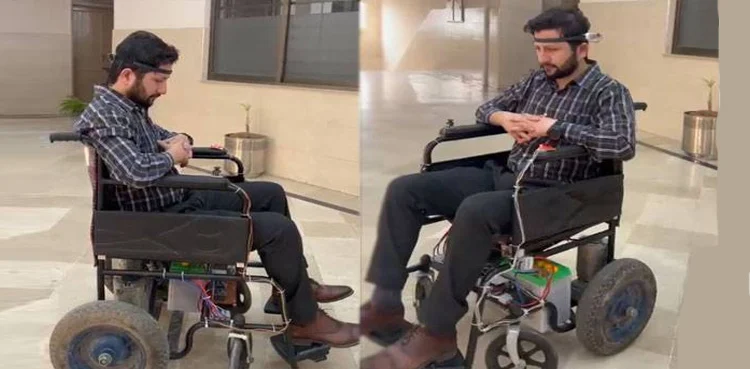In a groundbreaking development, two talented students from the Engineering University of Mardan, Dawood and Faizan Akhtar, have designed an advanced wheelchair that can be controlled by the user’s mind. This innovative invention promises to significantly enhance the mobility and independence of individuals who are severely debilitated or paralyzed, offering a new lease on life for those confined to wheelchairs.
Inspiration and Vision
The inspiration for this project came from the renowned physicist Stephen Hawking, who famously utilized advanced technology to communicate and move despite his severe disability. Dawood and Faizan shared their journey and the details of their remarkable invention during an appearance on ARA News’ program “Abinara Sawira.” They explained that their wheelchair is designed to be operated entirely through the mind, eliminating the need for physical assistance or manual controls.
How It Works
The mind-controlled wheelchair is equipped with an array of sensors and multiple batteries to ensure reliable and long-lasting operation. The key feature of this wheelchair is its ability to interpret the user’s mental commands and translate them into movements. Here’s how it functions:
Brain-Computer Interface (BCI): The wheelchair uses a brain-computer interface to detect and interpret electrical signals generated by the brain. These signals are then processed and converted into commands that control the wheelchair’s movements.
Sensor Integration: Advanced sensors are embedded within the wheelchair to capture the user’s brain activity. These sensors are capable of detecting even subtle changes in brain signals, ensuring precise and responsive control.
User Intent Recognition: By focusing on specific thoughts, such as moving forward, backward, left, or right, the user can direct the wheelchair’s movements. This system is designed to be intuitive, making it accessible for users with varying degrees of disability.
Battery Power: The wheelchair is powered by several high-capacity batteries, ensuring that it remains operational for extended periods. This is crucial for providing continuous mobility throughout the day without frequent recharging.
Benefits and Impact
The development of this mind-controlled wheelchair has the potential to revolutionize the lives of individuals with severe disabilities. Here are some of the key benefits:
Increased Independence: Users can operate the wheelchair without needing physical assistance, allowing them to move freely and perform daily activities with greater autonomy.
Enhanced Quality of Life: By providing a means of independent mobility, the wheelchair can significantly improve the quality of life for users, enabling them to engage more fully in social, professional, and recreational activities.
Accessibility: The intuitive design of the wheelchair makes it accessible to a wide range of users, including those who may not have the ability to speak or use their hands.
Innovation in Assistive Technology: This project represents a significant advancement in the field of assistive technology, showcasing the potential of integrating BCI technology into mobility aids.
Future Prospects
Dawood and Faizan’s invention is still in its developmental stages, but the promising results thus far suggest a bright future for this technology. The students are hopeful that with further research and development, the wheelchair can be refined and made available to a broader audience. They envision a future where advanced assistive technologies like their mind-controlled wheelchair become commonplace, greatly improving the lives of individuals with disabilities around the world.
The innovative mind-controlled wheelchair developed by Dawood and Faizan Akhtar from the Engineering University of Mardan represents a significant leap forward in assistive technology. By harnessing the power of the brain-computer interface, this invention offers new possibilities for individuals who are severely debilitated or paralyzed, providing them with greater independence and enhancing their quality of life. As the technology continues to evolve, it holds the potential to make a profound impact on the lives of countless individuals, highlighting the ingenuity and dedication of these young Pakistani innovators.



